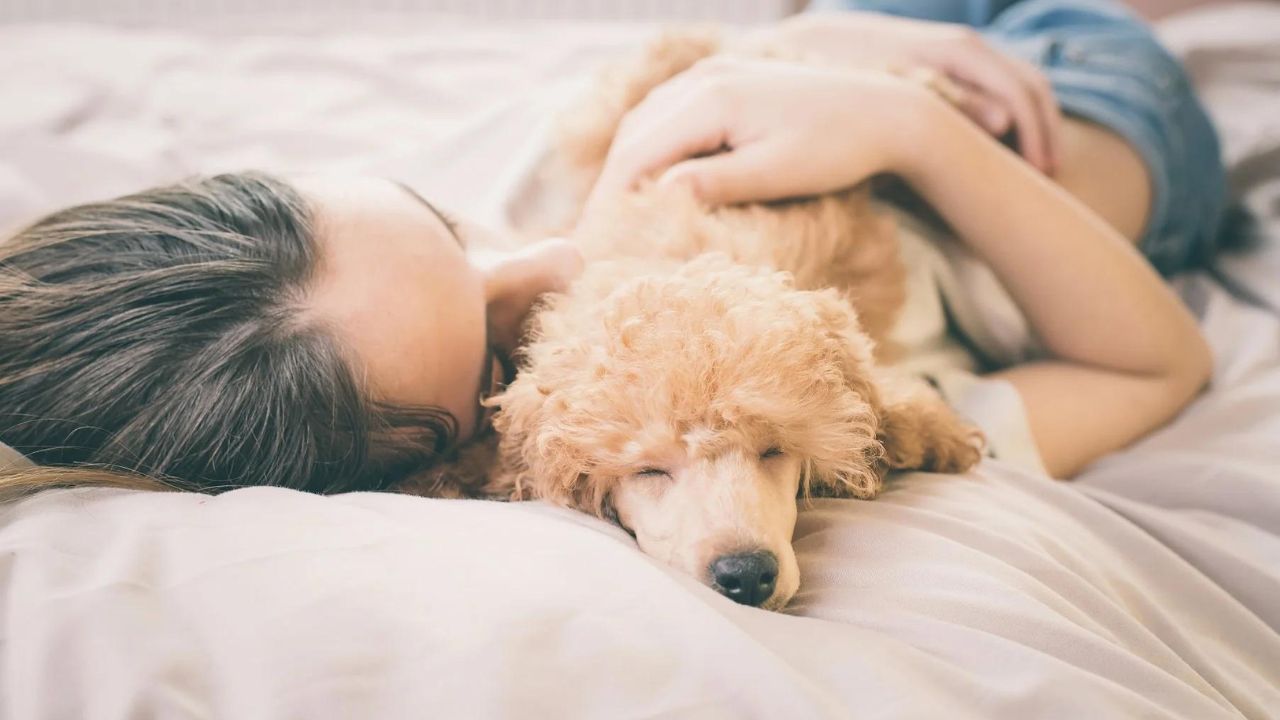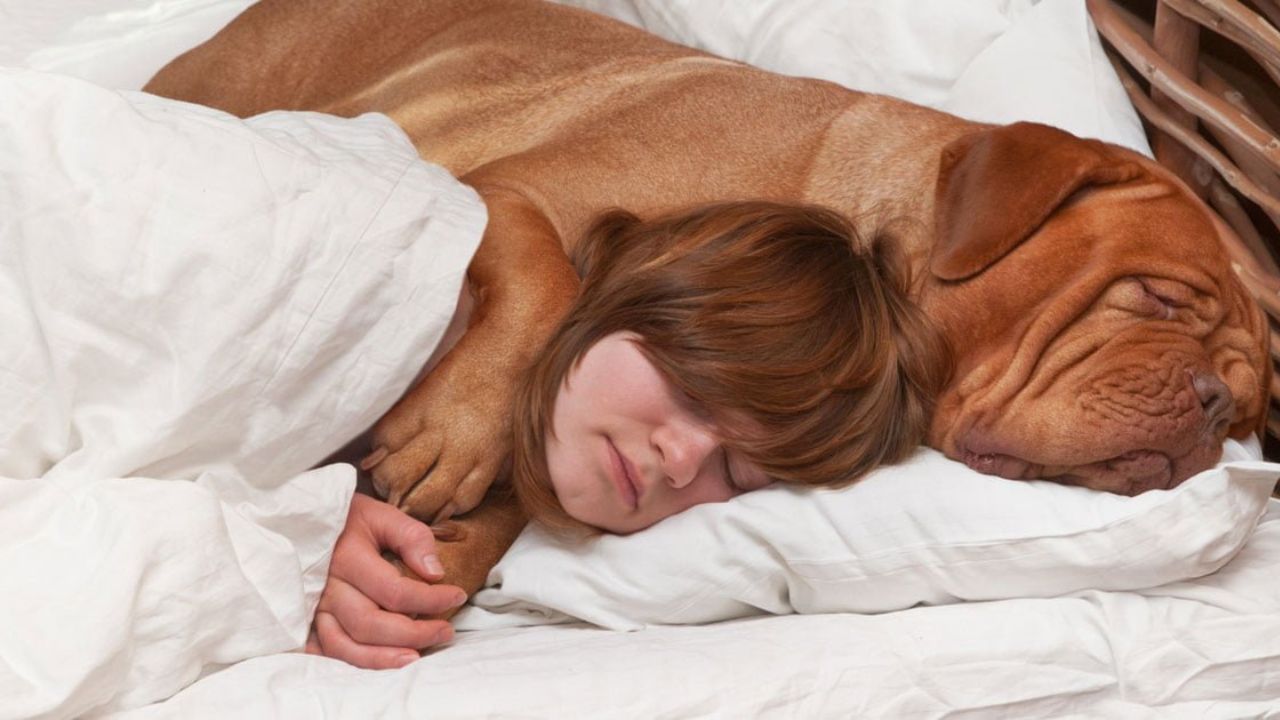The pros of letting your puppy sleep in bed include increased bonding and comfort. However, potential cons involve disruptions to your sleep, hygiene concerns, and the risk of behavioural issues. Balancing the emotional connection with practical considerations is crucial when deciding whether to allow your puppy in your bed, ensuring a positive and healthy coexistence.
The Pros of Letting Your Puppy Sleep in Your Bed
When it comes to letting your puppy sleep in your bed, several potential benefits exist. Research suggests that allowing your dog to share your sleeping space can help alleviate insomnia by reducing anxiety and promoting security. Additionally, co-sleeping with your puppy can strengthen your bond and provide a comforting presence throughout the night. The proximity can also be beneficial for dogs with separation anxiety. However, it’s important to be aware of the potential challenges, such as disrupted sleep schedules, the risk of accidents, and the need for stricter training. The decision should be based on your personal preferences and the specific needs of your puppy.
The Cons of Letting Your Puppy Sleep in Your Bed
When considering whether or not to let your puppy sleep in your bed, weighing the potential drawbacks is important. One of the main concerns is that constant proximity can make it harder for puppies to cope when they are separated from you, leading to increased whining, barking, and destructive behaviour. Another con is the potential disturbance of your sleep. As polyphasic sleepers, dogs may have different sleep patterns than humans, causing sleep disruptions. Additionally, allowing your puppy in bed can blur boundaries and lead to behavioural issues like possessiveness and difficulty transitioning to alternative sleeping arrangements. Maintaining hygiene and minimizing the risk of allergies and asthma are also important considerations.
Tips for a Successful Sleep Arrangement
When creating a successful sleep arrangement, several tips and strategies can help improve your sleep quality. Investing in a better mattress and bedding, blocking out light and minimizing noise, setting the thermostat to an optimal temperature, and following a consistent sleep schedule are all recommended by sleep experts.
Bedroom design also plays a crucial role, with suggestions such as placing your bed in a prime position for feng shui, removing reminders of work, clearing out clutter, and choosing calming colours. Additionally, arranging your bedroom to limit interfering light and investing in separate blankets and pillows for better-shared sleep can contribute to a restful night. Creating a comfortable and conducive sleep environment is essential for achieving quality rest.
Size and Breed of Your Puppy: The size and breed of your puppy can play a role in determining whether sharing your bed is practical or comfortable. Larger breeds may take up a significant amount of space and may not fit comfortably on your bed as they grow. Additionally, some breeds are more prone to certain health conditions, such as joint problems, which might be exacerbated by sleeping on soft surfaces like your bed.
Sleep Disturbances: Puppies tend to have irregular sleep patterns, especially during their early months. They might wake up during the night, whine, or need to go outside for bathroom breaks. These interruptions can disrupt both your sleep and your puppy’s sleep. If you are a light sleeper or easily disturbed, consider alternative sleeping arrangements for your puppy.
Multiple Pets in the Bed: If you already have other pets that sleep in your bed, adding a new puppy can introduce dynamics that may only work for someone. Some animals might need to be more comfortable sharing their sleeping space, leading to conflicts or tense situations. It’s essential to consider the personalities and compatibility of all animals involved before deciding.
Partner or Family Preferences: If you share your bed with a partner or have family members who sleep in the same space, their preferences and comfort must be considered. Discuss the idea of having a puppy in the bed and ensure everyone is on the same page. Establishing open communication and finding a solution that works for everyone involved is crucial.
Alternatives to Letting Your Puppy Sleep in Your Bed

If you’re looking for alternatives to letting your puppy sleep in your bed, consider several options. One approach is teaching your dog to sleep in their bed using positive reinforcement techniques. You can use treats and commands to reward your dog for settling in their designated sleeping area. Another option is to break the habit by retraining your dog to sleep independently.
This requires consistent effort and may involve providing a comfortable and appropriately sized sleeping space, such as a cosy dog bed or crate. Ultimately, finding an alternative sleeping arrangement that works for you and your puppy will promote healthy boundaries and ensure a restful night’s sleep for everyone involved. (Sources: How I Met My Dog, DogsBestLife, Reddit, Zigzag.dog, Susan Garrett Dog Agility, Tractive, Quora, Whole Dog Journal, Purina Arabia)
Crate Training: Crate training is a popular and effective method to teach your puppy to sleep in their space. Provide a comfortable crate with cosy bedding and gradually accustom them to sleeping inside. With time and positive reinforcement, your puppy will view their crate as a safe and secure sleeping area.
Dog Bed in Your Room: If you prefer to have your puppy close by but not on your bed, consider placing a dog bed or a comfortable sleeping pad in your bedroom. This way, your puppy can still be near you while having their designated sleeping spot.
Separate Sleeping Area: If you have enough space in your home, you can create a separate sleeping area for your puppy. This can be a designated room or a gated-off section of a room. Ensure the area is comfortable secure, and contains everything your puppy needs, such as water, toys, and a cozy bed.
Transition to an Outdoor Kennel: Depending on your living situation and climate, consider transitioning your puppy to an outdoor kennel or doghouse once they are old enough and well-adjusted. This allows them to have their own space while still near your home.
Conclusion
Puppy sleeping in my bed, It’s up to you to decide whether or not to let your puppy sleep in your bed; it all depends on your lifestyle, your pet’s needs, and your preferences. Consider the pros and cons discussed, and evaluate what will work best for you and your furry friend. Remember, your puppy’s happiness, comfort, and well-being should always be a top priority, regardless of where they choose to sleep.
FAQ
Should I Let The Puppy Sleep in My Bed?
There’s nothing wrong with your puppy sleeping in bed with you. But be sure to think about this realistically. Remember, if you have a bigger dog, think about how much space they would take up in the bed when they’re fully grown.
Should I Ignore Puppy Crying At Night?
No, don’t ignore your puppy crying at night. As above, it could make the problem worse. Ignoring your puppy won’t teach them to self-soothe; it’ll just teach them that you aren’t coming to help or comfort them, even if they need it. It can cause anxiety and damage your bond.
Do Puppies Get Sad When They Leave Their Mom?
Complete separation from his mother and littermates might initially be scary for a puppy, and it’s natural for him to cry or whine during this adjustment period. However, with affection and socialization, the puppy will quickly adjust to his new environment.
How Can I Tell If My Puppy Is Sad?
Withdrawing and Hiding. Your dog may be experiencing stress or sadness if they withdraw or go missing in strange areas of the house. “They might be slumbering in a closet or beneath the bed. This is a typical symptom of depression in dogs, according to Ochoa.

